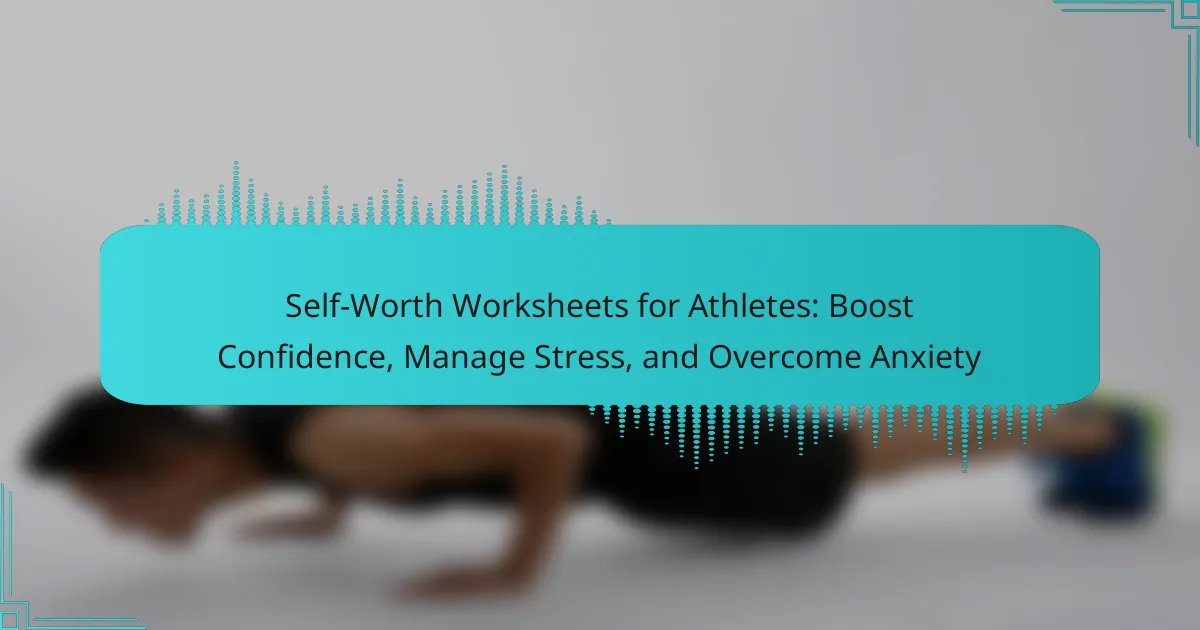Boosting confidence and managing stress are crucial for athletes facing high-pressure situations. Self-worth worksheets provide structured tools for self-reflection and goal-setting. These worksheets help identify strengths, track progress, and reduce anxiety. Regular use fosters a positive mindset, enhancing performance and resilience.

How Can Self-Worth Worksheets Enhance Confidence in Athletes?
Self-worth worksheets can significantly enhance confidence in athletes by providing structured self-reflection and goal-setting tools. These worksheets help athletes identify strengths, track progress, and manage negative thoughts. As a result, athletes experience increased self-esteem and reduced anxiety. Regular use of these worksheets promotes a positive mindset, essential for peak performance. Studies show that athletes who engage in self-worth exercises report higher levels of confidence and lower stress levels during competitions.
What are the key components of effective self-worth worksheets?
Effective self-worth worksheets for athletes include components that enhance confidence, manage stress, and overcome anxiety. Key elements are goal-setting exercises, positive affirmations, self-reflection prompts, and stress management techniques. These components help athletes develop a strong sense of self-worth, crucial for performance. Incorporating measurable outcomes, such as tracking progress over time, further strengthens the effectiveness of these worksheets.
How do self-worth worksheets help in managing stress?
Self-worth worksheets help athletes manage stress by providing structured self-reflection and goal-setting. These tools enhance self-awareness, promote positive thinking, and build resilience. Athletes can identify negative beliefs and replace them with affirmations, reducing anxiety and improving performance. Regular use fosters a growth mindset, crucial for overcoming challenges in competitive environments.
What specific exercises are included in self-worth worksheets?
Self-worth worksheets for athletes typically include exercises such as self-reflection prompts, positive affirmations, goal-setting activities, visualization techniques, and stress management strategies. These exercises aim to enhance confidence, manage stress, and alleviate anxiety.
How can athletes track their progress using these worksheets?
Athletes can track progress using self-worth worksheets by regularly assessing their confidence, stress levels, and anxiety. These worksheets provide structured reflections, enabling athletes to identify patterns and set measurable goals. By recording their feelings and achievements, athletes can visualize growth over time, enhancing motivation and focus. Regular usage fosters a deeper understanding of personal development, leading to improved performance and mental resilience.
In what ways do self-worth worksheets address anxiety?
Self-worth worksheets address anxiety by helping athletes build confidence and recognize their value. These worksheets provide structured exercises that encourage self-reflection and positive affirmations. As a result, athletes can identify negative thought patterns contributing to anxiety. This practice enhances emotional resilience, enabling better stress management during competitions. Engaging with these tools fosters a supportive mindset, which is crucial for overcoming performance-related anxiety.
What techniques can athletes use to overcome anxiety through worksheets?
Athletes can use self-worth worksheets to identify triggers, set goals, and practice positive affirmations to manage anxiety. These worksheets facilitate self-reflection, helping athletes recognize their strengths and build confidence. Techniques include journaling about achievements, visualizing success, and developing coping strategies for high-pressure situations. Regular use can enhance emotional resilience and improve performance under stress.

What are the unique benefits of using self-worth worksheets for athletes?
Self-worth worksheets for athletes provide unique benefits by enhancing confidence, managing stress, and reducing anxiety. These worksheets help athletes identify strengths and set personal goals, fostering a positive self-image. Increased self-awareness leads to improved performance and resilience in challenging situations. Furthermore, regular use of these worksheets can create a structured approach to mental training, which is often overlooked in athletic development.
How do personalized worksheets differ from generic versions?
Personalized worksheets are tailored to individual athlete needs, while generic versions lack customization. Personalized worksheets address specific confidence issues, stress management techniques, and anxiety triggers unique to each athlete. This targeted approach enhances effectiveness, leading to improved self-worth and performance. Generic worksheets may provide broad strategies but fail to resonate on a personal level, limiting their impact.
What role does feedback play in the effectiveness of self-worth worksheets?
Feedback is essential for enhancing the effectiveness of self-worth worksheets for athletes. It provides insights into personal growth and areas needing improvement. Constructive feedback can reinforce positive behaviors, making athletes feel valued and understood. Additionally, it encourages self-reflection, allowing athletes to identify strengths and weaknesses. Regular feedback helps in tracking progress, which is crucial for building confidence and managing stress. Ultimately, effective feedback transforms self-worth worksheets from simple tools into powerful resources for overcoming anxiety and fostering resilience.

What are some rare but impactful features of self-worth worksheets?
Self-worth worksheets for athletes often include rare but impactful features that enhance their effectiveness. One such feature is personalized feedback, which tailors insights based on individual performance and emotional responses. Another rare attribute is guided visualization techniques, fostering a deeper connection between self-worth and athletic performance. Additionally, worksheets may incorporate stress management strategies specifically designed for high-pressure situations, which can significantly improve mental resilience. Lastly, the inclusion of goal-setting frameworks that align with personal values can create a more meaningful experience, driving athletes to engage more fully with their self-worth journey.
How can visualization techniques be integrated into self-worth worksheets?
Visualization techniques can enhance self-worth worksheets by creating mental imagery that reinforces positive self-perception. Athletes can utilize visualization to picture their achievements, fostering confidence and reducing stress. Techniques like guided imagery or vision boards can be integrated into worksheets, allowing athletes to visualize success and set clear goals. This approach aligns with the unique attribute of enhancing mental resilience, crucial for overcoming anxiety in competitive environments. Regular practice of these techniques can lead to lasting improvements in self-esteem and performance.
What are the long-term benefits of consistent worksheet usage?
Consistent worksheet usage offers long-term benefits such as enhanced self-esteem, improved stress management, and reduced anxiety for athletes. Regular engagement with self-worth worksheets cultivates a positive mindset, fostering resilience and confidence over time. Studies show that athletes who utilize these tools report greater emotional stability and performance consistency. Furthermore, these worksheets can serve as a unique strategy for personal growth, helping athletes identify strengths and set achievable goals.

What common mistakes do athletes make when using self-worth worksheets?
Athletes often make mistakes when using self-worth worksheets, leading to ineffective outcomes. Common errors include setting unrealistic expectations, focusing solely on outcomes rather than personal growth, neglecting emotional reflection, and failing to regularly update their worksheets. These pitfalls can hinder the intended benefits of boosting confidence and managing stress.
How can athletes optimize their use of self-worth worksheets for better outcomes?
Athletes can optimize self-worth worksheets by integrating them into daily routines, fostering reflection and goal-setting. Regular use enhances self-awareness, boosts confidence, and reduces anxiety. Tracking progress through these worksheets allows athletes to identify patterns and adjust strategies effectively. Engaging with a coach or therapist can further deepen the impact, providing personalized insights and accountability.
What expert insights can enhance the effectiveness of self-worth worksheets?
Expert insights can significantly enhance the effectiveness of self-worth worksheets for athletes by incorporating psychological strategies and evidence-based practices. One effective approach is the integration of cognitive-behavioral techniques, which help athletes identify and challenge negative thought patterns. This method fosters resilience and a positive self-image.
Another valuable insight is the use of goal-setting frameworks. By defining specific, measurable, achievable, relevant, and time-bound (SMART) goals, athletes can track progress and build confidence. Additionally, incorporating mindfulness exercises can help athletes manage stress and anxiety, promoting a greater sense of self-worth.
Finally, peer feedback and support can enhance the worksheets’ impact. Encouraging athletes to share their experiences fosters a sense of community and accountability, reinforcing positive self-perception.


